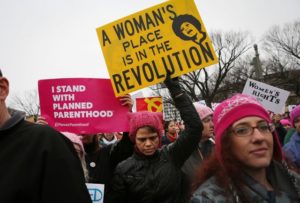
Critics of the “A Day Without a Woman” protest argued that only privileged women who could afford to take off work would be able to participate. (Photo by Mario Tama/Getty Images)
It’s hard to imagine a world without women, right? How about just one day?
Millions of women across the U.S. and abroad are making that a reality this International Women’s Day (March 8), taking the day off to join the fight for equal rights.
The annual celebration, which has been observed since the early 1900s, is a collective day of fanfare honoring the social, economic, cultural and political achievements of women. The day also marks a call to action to highlight the ongoing struggle for gender equality, according to the event’s official website.
“The story of women’s struggle for equality belongs to no single feminist nor to any one organization but to the collective efforts of all who care about human rights,” said world-renowned feminist and political activist Gloria Steinem. “Thus, International Women’s Day is all about unity, celebration, reflection, advocacy and action — whatever that looks like globally at a local level.”
Here in the U.S., millions of women are skipping out on work to take part in a nationwide protest dubbed “A Day Without a Woman.” Event organizers asked that women take the day off from paid and unpaid labor, avoid shopping for one day (except at small, women- or minority-owned businesses) and/or wear the color red to show solidarity with the movement.
The protest, organized by the same leaders who planned the wildly popular Women’s March on Washington on Jan. 21 following the inauguration of contested President Donald Trump, is aimed at highlighting the economic power of women and the impact they have on society. For instance, the mass walkout has left some parents scrambling for child care, according to CNN, while an entire school district in Prince George’s County, Maryland, was forced to close after 1,700 teachers and nearly a third of its transportation staff requested the day off to take part in the protest(s).
Even President Trump, in his usual fashion, took to Twitter early Wednesday morning to ask the nation to join him in “honoring the critical role of women here in America and around the world.”
On International Women's Day, join me in honoring the critical role of women here in America & around the world.
— Donald J. Trump (@realDonaldTrump) March 8, 2017
Meanwhile, across the pond, British Prime Minister Theresa May celebrated International Women’s Day in Parliament by announcing the government’s pledge to provide an additional $24.3 million to support organizations fighting domestic violence and abuse, CNN reported. The United Nations also called on governments to commit to supporting programs that address the ongoing challenges that hold back girls and women. Today, only 50 percent of working-age women are represented in the global labor force, compared to 76 percent of men, according to the agency.
“Denying the rights of women and girls is not only wrong in itself,” UN Secretary-General Antonio Guterres said in a statement Monday, “it has a serious social and economic impact that holds us all back. Gender equality has a transformative effect that is essential to fully functioning communities, societies and economies.”
According to BBC News, thousands of women across Ireland went on strike and wore black to protest the country’s stringent abortion laws. Similar rallies calling for equal rights and gender parity also took place in London and Amsterdam, among other major cities across Europe, Asia and Africa.
While millions of women across the world seized the opportunity to participate in such a display of female unity, some have criticized the massive “A Day Without a Woman” strike as mostly a day without “privileged women.” Critics pointed out that while the protest was a noble idea, it unintentionally excluded more “vulnerable” women who can’t afford to miss a day of work due to economic insecurity. News site Quartz reported that women comprise nearly two-thirds of minimum-wage workers in the U.S., and women of color account for over half of those earning minimum wage or less.
“The number of these sorts of jobs is only going to increase over the next decade,” the publication stated. “In other words, tens of millions of women have neither the benefits nor the flexibility to take the day off to protest.


